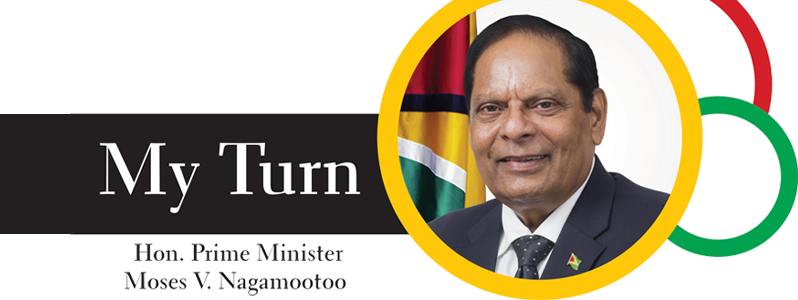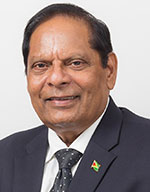OCTOBER 3 will mark 118 years of the Tribunal Award on the boundary between Guyana and Venezuela. The Award is binding under an international Treaty “as a full, perfect and final settlement of all the questions referred to the Arbitrators.”
The Arbitration Tribunal was appointed to determine the boundary-line between the then colony of British Guiana and the United States of Venezuela. It comprised five eminent international jurists.
One of the issues they had to examine was which country occupied what portion of land, undisturbed and exclusively, over many years. The Treaty refers to this criterion as “adverse holding or title by prescription.” The findings were binding on all parties.
BACK-PEDALLED
Venezuela has back-pedalled on its treaty obligation to accept the Award, and did so for the first time, only in 1962. It has since been recognised that Cold War forces were behind Venezuela’s contention that the Award was void. The ensuing intrigues and interventions were aimed at pressuring Great Britain not to grant independence to Guyana under Cheddi Jagan as Head of Government, during that period of anti-communist hysteria.
With the Cold War over since 1989, a fresh political air of new thinking should influence Venezuela-Guyana relations. Assertive Venezuelan leaders still have time to dislodge themselves from the embrace of the divisive, colonial Cold War monster.
In his address at the United Nations on September 20 last, Guyana’s President David Granger reminded the world that Venezuela has claimed two-thirds of Guyana’s territory. Later, Foreign Affairs Minister, Vice-president Carl Greenidge, explained at a UN Social Media platform that there is no other case in the world where one country claims two-thirds of another country. He stated that that claim includes ALL of Guyana’s maritime space.
FATAL EFFECT
President Granger underlined the fatal effect of Venezuela’s false claim as it is intended to deny Guyana not only access to the sea, but entitlement to our fishing, and oil and gas potential. He told the world: “We depend on our territorial and maritime resources for development and for the release of our people from poverty.”
Irrespective of ideological leanings, the world respects adherence to international law, and would eventually agree that only a juridical settlement to Venezuela’s contention, before the International Court of Justice, is the clear path to peace and justice.
MANY FRIENDS
Guyana has many friends, thanks to the dedicated efforts of a whole host of advocates and experts including former Foreign Affairs Minister Rashleigh Jackson and Sir Shridat Ramphal, former Secretary-General of the Commonwealth of Nations.
Guyana has enjoyed solid support from the Commonwealth with its Ministerial Group re-affirming just last week in New York its unequivocal and collective support of Commonwealth member governments for the maintenance and preservation of Guyana’s sovereignty and territorial borders, in accordance with the 1899 Arbitral Award.
I am grateful to journalist/diplomat Peter Halder for sending me ideas from time to time on how we should promote awareness about our border issues. He suggests that on October 3, all schools should raise the Guyana flag and that our children should sing, in unison, Dave Martins’ now celebrated song, “Not a Blade of Grass.”
That we should have a unified voice that says “Country First” and a collective, patriotic heart that beats and lives for our beloved Guyana, must be accepted by all. We cannot split hairs over the sanctity of our borders.
TheGuyanese people are still baffled by statements attributed to Opposition leader Bharrat Jagdeo that he was considering a “slight concession” of Guyana’s river territory to Venezuela. (Inewsguyana – October 23, 2015). Reporter Jomo Paul quoted him as saying under his tenure he would have considered the option of surrendering parts of Guyana’s riverain territory to Venezuela. He said: “You could probably on the maritime area, give Venezuela a channel out to the sea”.
SALAMI EFFECT
In a reaction to what Jagdeo had said, Stabroek News (October 24, 2015) referred to what former President Forbes Burnham had described as the “salami effect,” that is, once you gave Venezuela one slice, it would come back for more.
At that time too, Senior Counsel Ralph Ramkarran, a former PPP leader and a Guyana-appointed UN Good Office representative, did not share Jagdeo’s uneducated views. He stated that Venezuela doesn’t need a channel, since it already has innocent passage to the Atlantic. Under the Tribunal Award both Guyana and Venezuela enjoy rights of ships on shared rivers, such as the Amakuru and Barima.
WE CANNOT SELL OUT
At that time, too, President Granger had retorted: “We cannot sell out. We cannot give away. We cannot offer the adversary any corridor or any passage.”
I am sure that the opposition leader has since regretted that he had made those unacceptable utterances. What I know, for sure, is that the PPP does not support any give-away posture, and defends Guyana’s territorial integrity. In this cause, we are solidly united!
The next three months would be crucial in the search for a definitive resolution of Venezuela’s contention and its rejection of treaty obligations. It is time that the friendly and peaceful Venezuelan people tell their government to let go of this false claim, and to allow our two countries to coexist peacefully apart.
In the meantime, all Guyanese – here and in the diaspora – should resolve: Country First!




.png)









